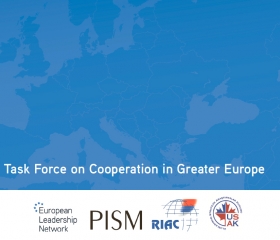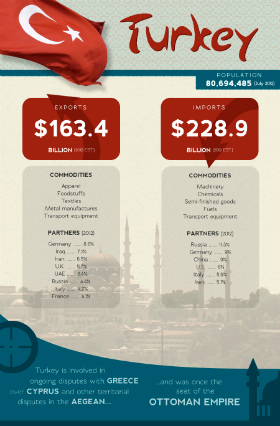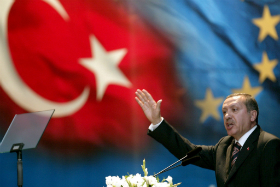Does Turkey Need Greater Europe?
(no votes) |
(0 votes) |
Doctor of Political Science, Director of the Centre for Comparative Governance Studies, Saint-Petersburg School of Social Sciences and Area Studies, HSE Campus in St. Petersburg
Despite impressive progress in recent years, Turkey has so far failed to make a strategic choice between developing the country as a global and open force and “Muslim parochial conservatism.” We believe that Turkey now needs a more pragmatic and multilateral agenda, namely the formation of a Greater Europe. Further, the sooner Turkey becomes actively involved in discussing this Greater Europe project, the more likely it becomes that it will correspond to its aspirations and interests.
Despite impressive progress in recent years, Turkey has so far failed to make a strategic choice between developing the country as a global and open force and “Muslim parochial conservatism.” The first option is often associated solely with the country's EU membership prospects. Today, however, we witness a great deal of uncertainty regarding Turkey's accession to the EU, the nature of this process and the broader implications of entry (should it take place). We believe that Turkey now needs a more pragmatic and multilateral agenda, namely the formation of a Greater Europe. Further, the sooner Turkey becomes actively involved in discussing this Greater Europe project, the more likely it becomes that it will correspond to its aspirations and interests.
The expert and political communities have recently displayed avid interest in the project of creating a Greater Europe. The three poles of extremely diverse and asymmetrically arranged spaces – Russia, the European Union and Turkey – and the nature of their relations play a decisive role in shaping the prospects of forming a Greater European “security community.” Meanwhile, growing competition among these poles leads to the opposite result, the creation of asymmetrical multipolarity within Greater Europe. Preserving and strengthening this trend means maintaining a system that is essentially dysfunctional and generates instability. Moreover, further “divergence” of the poles and their rivalry for spheres of influence (including within Europe) undermine the European continent’s competitiveness in the world and push it into the strategic periphery.
Growing competition among these poles leads to the opposite result, the creation of asymmetrical multipolarity within Greater Europe. Preserving and strengthening this trend means maintaining a system that is essentially dysfunctional and generates instability.
Efforts to prevent the emergence and strengthening of new dividing lines in Europe are the imperative prerequisite for the situation to change.
At the same time, finding its own place in Greater Europe, understanding and accepting the attractiveness of the project not only (less) for the continent’s common good but primarily for the benefit of each pole is one of the most important preconditions for creating this Greater Europe. In other words, each pole must be clearly cognizant of the benefits it stands to gain from participation in Greater Europe.
Therefore, the questions arise that are far from rhetorical. Does Turkey really need Greater Europe? What is more beneficial for the country – taking an active part in building Greater Europe or confining its European agenda to its prospects for EU membership and concentrating solely on these efforts?
Turkey: Great Successes and Deep Divisions
Turkey today is receiving ever more attention. Located at the crossroads of Asia and Europe, linking the Black Sea and the Mediterranean, the country occupies a key geostrategic position. The pace of Turkish development is amazing: in the last decade its economy grew almost threefold; and on average Turkish people are now just 30 percent less wealthy than average EU citizens. Turkey is called “the most important political experiment,” referring to the project of building a Muslim, democratic, secular, and economically stable country that links the EU with the Middle East. Turkey (alongside Brazil, India and Indonesia) is considered a “global swing” state.
Each of these four nations possesses a large and growing economy, a strategic location in their region and a commitment to democratic institutions. One crucial factor is that each nation’s international role is not yet defined, and fluctuates. It is these mixed political orientations that lend more weight and significance to these countries than one might assume judging by the size of their population and economy [1].
But this is only part of the story. Despite this significant progress, Turkey remains politically divided. It has yet to make the strategic choice between becoming a global power and taking a more parochial path. The split within Turkey is deep and has many dimensions. Most experts view it as the latest stage in the long struggle between Islamism and Kemal Ataturk’s secularism. Others point to the traditional split between conservative Anatolia and modern Istanbul, between egalitarianism and elitism, between democratic and authoritarian political choice [2].
In addition, a “fresh” territorial split caused by relatively new processes in the private sector, i.e. the impressive growth of the so-called “Anatolian Tigers,” is gaining momentum. Anatolian Tigers is a term used to refer to conservative-minded middle-class people who live mainly in Turkey’s southeast regions. For this group, EU membership is not a priority. On the contrary, they support the reorientation of Turkish foreign economic strategy toward the countries of the Middle East and North Africa. The Tigers consider this area to be the most promising for intensified market development. Geographically nearby – this territory is also close culturally, and the level of competition there is still relatively low. The Anatolian middle class is in fact acting as a kind of promoter of Turkish rapprochement with its eastern and southern neighbors. Not only is the image of the European Union in Turkey deteriorating – it is deteriorating fast. It is important to understand that the continuation of this trend in the long term could pose a serious problem, not only in terms of the country's accession to the EU, but also to prospects of attaining a less ambitious goal, namely the development of political cooperation between Turkey and the EU.
What’s at Stake for Turkey Outside the EU?
Failure to join the EU would be accompanied by a significant “brain-drain” affecting the creative class, could not only see reforms rolled back but could also fuel the popularity of hardline anti-EU views.
Turkey's attitude to Europe has traditionally been colored by the country’s prospects for EU membership. Indeed, Turkey's accession to the EU is in every respect an extraordinary process. The question of Turkey’s full membership of the European Union is undoubtedly a key issue for the country’s future and its strategic choice in both foreign and domestic policies. In recent decades a number of countries have joined international organizations, but the problem of choosing a strategic path has never been as acute as it is in Turkey [3].
Failure to join the EU has often been viewed as fraught with problems. First, there is talk that it would be accompanied by a significant “brain-drain” affecting the creative class, i.e. people who value freedom of speech, media, assembly and association, as well as personal freedom. This “creative class” regards Turkey's EU accession – in reality and not just on paper – as a default guarantee that the country has prioritized and will uphold these values. Second, the non-membership of the EU could not only see reforms rolled back but could also fuel the popularity of hardline anti-EU views [4]. Moreover, since formally democratic institutions are already operating in Turkey, the country risks falling into the trap of a hybrid regime, faced with the difficult task of balancing between the existing formal democracy and weak authoritarianism.
In Brussels, of course, there is an understanding that, should the negotiating process run into delays, Turkey’s leadership, disappointed, will continue to dissociate itself from the European Union both politically and ideologically. Putting other considerations to one side, the absence of any significant achievements and the lack of any clear signal on when the negotiation process will or could have a positive outcome will have serious negative consequences for the perception of the EU among Europe’s Muslim community. For this community, the outcome of negotiations on Turkey is a kind of test on the place and role of Muslims on the continent.
What’s at Stake for the EU if it Embraces Turkey?
On the other hand, Turkey's accession is fraught with numerous problems for the EU. Indeed, Turkey's membership would undoubtedly have a profound impact on y both the material (the inevitable redistribution of financial resources) and conceptual components of how the EU operates. Therefore, the decision to admit the country cannot be made solely on the basis of progress on meeting the Copenhagen criteria. At least three additional factors, i.e. material costs of the country's EU membership, the perception of its “European character” and the internal dynamics of EU development, will play a major role [5].
The specific nature of Turkey's accession as an issue manifests itself in the negotiation process. For the first time in EU enlargement history, negotiations are defined as “an open-ended process, the outcome of which cannot be guaranteed beforehand” [6]. Thus, the EU actually reserves the right to withdraw from negotiations on Turkey's membership
The decision to admit the country cannot be made solely on the basis of progress on meeting the Copenhagen criteria. At least three additional factors, i.e. material costs of the country's EU membership, the perception of its “European character” and the internal dynamics of EU development, will play a major role.
[7]. In addition, it is important to take into account the nature of the EU’s decision-making process on the admission of new members. Turkey’s main task and key priorities are to develop a political dialogue with all EU member-states without exception (playing, naturally, its own game), rather than adapting to the acquis communautaire (i.e. accumulated legislation, laws, and court decisions which constitute the body of European Union law). Overturning hundreds of possible vetoes, which potentially could be imposed by any EU country on any issue, is an exceptionally difficult task. That is why accession negotiations with Turkey, regardless of what is discussed, are unequivocally shaped by politics and politics alone. The negotiations will, after all, result in a political decision [8].
In addition, the degree of uncertainty associated with the process of Turkey’s EU accession highlights the need to overcome the impact of the global financial and economic crisis and to discuss the eurozone’s future.
Inside the EU, the issue of Turkey’s accession causes a split within the elites and within society more broadly. The EU member-states’ national elites are very far from reaching consensus on Turkey's accession to the EU: some support its full integration, while others advocate a “privileged partnership” format. In 2009 Nicolas Sarkozy spoke directly against the country's accession to the Union, arguing that Turkey “is not intended to become an EU member,” adding that Ankara should nevertheless be closely linked to the EU both economically and through security institutions [9].

Task Force Position Paper
Opting for “privileged partnership” is rather problematic. While there is no agreed definition of the term, it is clear that this status puts Turkey somewhere between association (the status Turkey currently has) and full membership. Of course, the EU can set a goal of increasing Turkey's role in its institutions and policies, but this enhanced participation (in a limited scope of activities) is unlikely to be viewed as an attractive proposition by a country that has long been striving for full membership, not some kind of halfway house [10].
EU citizens are less than eager to welcome Turkey’s accession. According to opinion polls, 78 percent of Austrians, 63 percent of Germans and 61 percent of the French oppose this project. These figures indicate that any political decision taken at the elite level (even if many potential vetoes are overridden) would not mean that “Turkey is already in Europe.” The issue of Turkey's application for EU membership must be resolved in such a way that factors in both the institutional component and the EU citizens’ perception of their common identity [11].
Greater Europe as a Multilateral, Pragmatic Agenda for Turkey
It would be an obvious error to narrow Turkey's relations with Europe down to the issue of the country's EU membership. Turkey needs a more pragmatic and multilateral agenda, especially since the last decade has witnessed significant diversification of Turkey’s foreign economic policies, in the sense that Turkish firms operating in different sectors have started to pursue comprehensive internationalization strategies [12]. Building a Greater Europe could become just such an agenda and the driving force of a further development of the “Turkish experiment.” (It is important to note that building a Greater Europe does not close the door to Turkey's EU membership: these are two different, but not mutually exclusive, agendas).
Building a Greater Europe does not close the door to Turkey's EU membership: these are two different, but not mutually exclusive, agendas.
Turkey's active participation in creating a Greater Europe will allow the country to address a number of important problems. So, the concept of a Greater Europe makes it possible for Turkey to free itself from the historical burden of marginality and create a positive agenda of accession to and involvement in affairs on the European continent [13]. The Greater Europe project organically removes the issue of Turkey’s cultural and religious differences that make EU citizens so anxious. It enables Turkey to fully realize the benefits of its unique geopolitical location as a bridge between the EU and Russia [14]. Turkey has a clear interest in developing relations with both of these poles, due to the geopolitical reality (and specificity) of this regional power. However, these both poles are also interested in Turkey, which is in a prime position to play a key role in structuring the whole of Greater Europe.
The most promising approach for Turkey rests on the following considerations:
(a) Building a Greater Europe would defuse tensions over the country's EU membership and show Brussels that Turkey has alternative ways of becoming involved in developments on the continent.
(b) Participation in a Greater Europe could help vanquish skepticism about Turkey in a number of European countries and promote the development of informal ties and stronger relations with individual member-countries.
(c) The sooner Turkey becomes actively involved in discussions on the Greater European project, the more likely it is that the project will meet its particular aspirations and interests. The project could develop in several ways, and the outcome (i.e. which option is realized) depends, in part, on Turkey’s participation.
(d) For Turkey, the concept of a Greater Europe is not just an abstract common good, but something concrete that offers the country particular benefits at this particular moment.
References:
1. Kliman Daniel, Fontaine Richard. Global Swing States: Brazil, India, Indonesia, Turkey and the Future of International Order. Report: The German Marshall Fund of the United States. November 2012
2. Cagaptay Soner. Turkey at the Crossroads. Los Angeles Times. March 06, 2013
3. Arvanitopoulos Constantine and Nikolaos Tzifakis. Introduction. In: Turkey’s Accession to the European Union: An Unusual Candidacy. Ed. by Arvanitopoulos Constantine. Springer-Verlag, Berlin, 2009, p.1
4. Ibid. р.1
5. Müftüler-Baç, M. (2008). Turkey’s accession to the European Union: The impact of the EU’s internal dynamics. International Studies Perspectives, 9(2), pp. 204–205
6. European Commission. (2005). Negotiating framework. Luxemburg, October 3. Available at http://ec.europa.eu/enlargement/pdf/st20002_05_TR_framedoc_en.pdf
7. Nugent, N. (2007). The EU’s response to Turkey’s membership application: Not just a weighing of costs and benefits. Journal of European Integration, 29(4), pp.494-495
8. Jorgensen Knud Erik, LaGro Esra. Conclusions and Perspectives: Whither Turkey’s Accession? In: Turkey and the European Union. Ed. by LaGro Esra and Knud Erik Jorgensen. UK: Palgrave, 2007, p.222
9. Sakwa Richard. Russia and Turkey: Rethinking Europe to Contest Outsider Status. Russia/NIS Centre, Ifri, Paris, 2010, p.18
10. İçener Erhan (2007) Privileged partnership: An alternative final destination for Turkey's integration with the European Union? // Perspectives on European Politics and Society, 8:4, 415-438)
11. Kutlay Mustafa. Skating on Thin Ice: The Political Economy of Turkish Foreign Policy Over the Last Decade. ISPI Analysis N 226, December 2013, p.3
12. Sakwa, p.21
13. Cohen Saul (2011) Turkey's Emergence as a Geopolitical Power Broker // Eurasian Geography and Economics, 52:2, p.225
14. Petr Dostál , Emel Akçalı and Marco Antonsich (2011) Turkey's Bid for European Union Membership: Between "Thick" and "Thin" Conceptions of Europe // Eurasian Geography and Economics, 52:2, p.214; Turkey and the European Union: Domestic Politics, Economic Integration and International Dynamics. Ed. by Ali Carkoglu and Barry Rubin. Frank Cass: London, 2005
15. Kubicek Paul (2011): Political conditionality and European Union's cultivation of democracy in Turkey, Democratization, 18:4, 910-931
16. Ananicz Szymon. The Sultans of Swing: Turkey’s Stance on Integration with the European Union. Centre for Eastern Studies. Point of View, N 37, November 2013, Warsaw, р.5
(no votes) |
(0 votes) |






